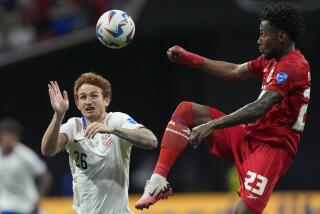WORLD CUP USA ’94 / THE FIRST ROUND : Bolivia Gropes for Answers, Finds Only Excuses : Aftermath: Despite solid play against Germany--mostly minus a contrite Etcheverry--it weakly blames elements.
- Share via
CHICAGO — Forgive the Bolivian World Cup team if it believes circumstances have conspired against it. Losing, as well as anything, makes the mind seek creative explanations for failure.
Begin with the fact that soccer’s minnow nation found itself in the opening game of the World Cup on Friday against defending champion Germany, the preeminent power in the sport, and add that the game was played in a city that boasts a substantial population of German descent.
Then there was the matter of Germany’s goal--which alone was enough to disappoint the Bolivians, inasmuch as they offered no answer to it--during the game. Afterward, they contended that Thomas Haessler was offside when he trapped the ball and deflected it off his chest to Juergen Klinsmann, who scored.
There was the banishment of the team’s most inspirational player, Marco Antonio Etcheverry, who was sent off for a hard tackle only three minutes after he entered the game late in the second half.
There were the elements that should have equally affected both teams but that the Bolivians came to see as being directed at them: nearly unbearable heat and humidity at the field level and the field itself, which was watered at halftime and rendered treacherously slippery.
The Bolivians’ frustrations were naturally exacerbated by how titillatingly close they came to pulling off what would have been one of the great upsets in World Cup history--an event the tiny Andean nation has been a part of only three times.
Blurted the exasperated Bolivian team press officer, Juan Francisco Roque: “I thought we should have won. It’s hard when you have to withstand a temperature of (87 degrees) and a humidity of 100%, when you have a referee who--well, let’s say his performance was average. All the things that we could control, we controlled. If the referee makes decisions only he understands. . . .”
Pride often speaks out of turn. If Bolivia had any goal Friday, it was to show the world that its surprising qualification--which had been dismissed as a fluke because of the team’s advantage of playing at high altitude--had been well and truly earned. Reality intervened.
“The respect for Germany is always there,” Bolivian midfielder Milton Melgar said. “What we were sure of at the start was that we knew how to play our game and what we had worked on. But we were unable to summon the strength.”
The team had managed to play Germany closely and received a spark when Etcheverry was substituted into the game in the 80th minute. “El Diablo,” as the striker is known, suffered a serious knee injury in November of 1993 and had not played for the national team until Friday’s brief appearance.
“We had decided to wait for the other team to be a little tired before putting him in,” Xavier Azkargorta, the Bolivian coach, said. “What we didn’t count on was having him on the field for such a short time.”
Etcheverry was humble and apologetic after the game, facing the media under extremely difficult circumstances. His first order of business was to apologize for his red card, received for kicking Lothar Matthaeus in the shin.
“First of all I want to say to Bolivia that I am sorry,” he said.
“All I can say is I’m sorry. I can’t say whether I did it or not. I think it will be very clear (on television replays) that I did it. But for me, the most important thing . . . is to apologize to the public because they were waiting for a good show and today I failed.”
Asked several times if he kicked Matthaeus, Etcheverry said: “You can see it in the replay. If I did kick him, it was part of the game. I believe a referee can make mistakes, as all of us do. They are only human. . . . My desire to play was great. I’ve been waiting seven months to play one game.”
And now he won’t play in Bolivia’s next game, which, the team hopes, will not contain as many unfair elements.
More to Read
Go beyond the scoreboard
Get the latest on L.A.'s teams in the daily Sports Report newsletter.
You may occasionally receive promotional content from the Los Angeles Times.







